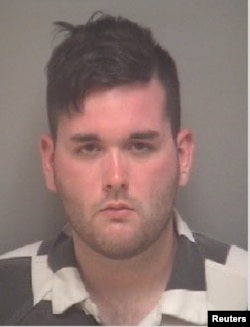The deadly violence in Charlottesville, Virginia, over the weekend, had the hallmarks of a tactic increasingly employed by Islamic State sympathizers in Europe: use of a vehicle as a weapon of terror.
James Alex Fields Jr., a 20-year-old Ohio man, rammed his car into a group of counter protesters at a white nationalist rally Saturday, killing one person and injuring 19 others.
But was the violence a hate crime or an act of domestic terrorism, and how should it be prosecuted?
It is a dilemma that prosecutors face as they investigate the attack and consider criminal charges against Fields.
State charges filed
Fields is being held on state charges of second-degree murder, malicious wounding and failure to stop at the scene of an accident that resulted in a death. Under Virginia law, conviction of second-degree murder carries a penalty of up to 40 years in prison.
But additional charges could follow as investigators from the Department of Justice and the FBI press forward with a civil rights investigation that was opened Saturday.
In a statement issued Sunday, the Justice Department said the attack could potentially have involved one or more hate crime statutes.
While the department did not rule out bringing terrorism charges in the case, it said that doing so would require “enough evidence to be suspicious that the suspect intended to send a message and not just harm immediate victims.”
U.S. Attorney General Jeff Sessions said Monday the “evil act” in Charlottesville meets the legal definition of domestic terrorism.
“We are pursuing it in the Department of Justice in every way that we can make a case," Sessions said on ABC's Good Morning America. "You can be sure we will charge and advance the investigation towards the most serious charges that can be brought because this is unequivocally an unacceptable, evil attack."
Domestic terrorism prosecutions rare
Historically, federal prosecutors have rarely brought terror charges in domestic terrorism cases, relying instead on traditional criminal statutes such as hate crime laws to bring charges.
That is partly because while federal law makes domestic terrorism a crime, it does not offer a specific charge for it.
As a result, some of the most high profile domestic terrorism cases have been prosecuted as under criminal statutes.
Oklahoma City bombing
Take the 1995 Oklahoma City bombing, the deadliest act of domestic terrorism before the attacks of September 11, 2001. Timothy McVeigh, the perpetrator, was charged with the use of a weapon of mass destruction, destruction with the use of explosives and eight counts of murder but he was never charged with “domestic terrorism.”
In the 2015 killing of nine black worshippers at a South Carolina church, a mass murder widely seen as an act of domestic terrorism, Dylann Roof was charged with and later convicted of 33 counts of federal hate crimes but no terror related charges were brought against him.
Prosecutors “have had a high degree of success using civil rights statutes,” said Brian Levin, a criminologist and director of the Center for the Study of Hate and Extremism at California State University.
The Charlottesville attack, he said, could be prosecuted as either a hate crime or an act of domestic terrorism. But “it might very well be easier for prosecutors to use the traditional hate crime statutes just because of the burdens of proof.”
Federal law defines domestic terrorism as acts intended to “intimidate or coerce” the public or influence government policy or action through “mass destruction, assassination or kidnapping.”
The FBI defines a hate crime as a criminal offense motivated by bias against race, religion, disability, sexual orientation, ethnicity, gender or gender identity.
Bringing terrorism-related charges will not necessarily help the prosecutors’ case against Fields, Levin said.
“On the one hand, there is a legitimate call by the community for this to be identified and prosecuted for what it is – which is both terrorism and hate crime – but we also have a high burden of legal requirements for prosecutors and give them discretion to try and prosecute these cases to the best of their ability,” he said.
Frederick Lawrence, a distinguished lecturer at the Georgetown Law Center, said that accurately describing a crime does matter.
“The criminal law is designed not only to punish but to express the highest values of the society,” Lawrence said. “What took place here allegedly is not merely a homicide, it’s a homicide with the kind of motivation that is particularly dangerous not only to the victim but to all people connected to the victim and, indeed, to the entire society.”







